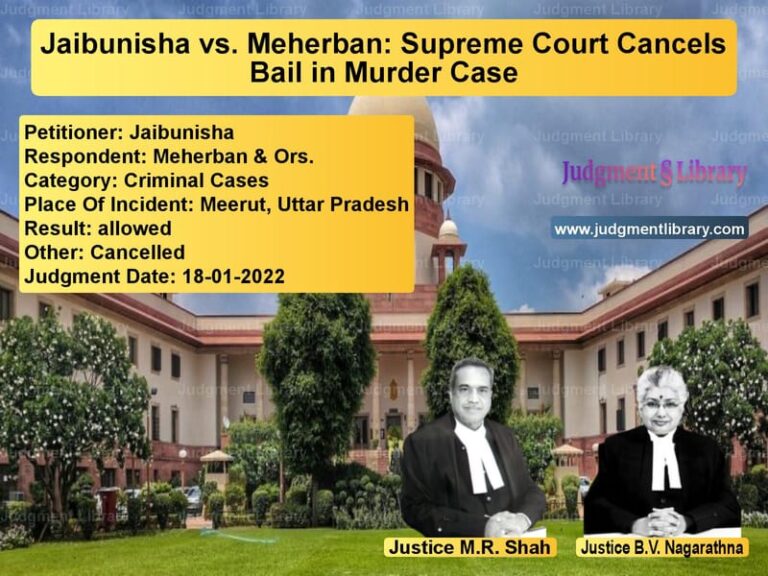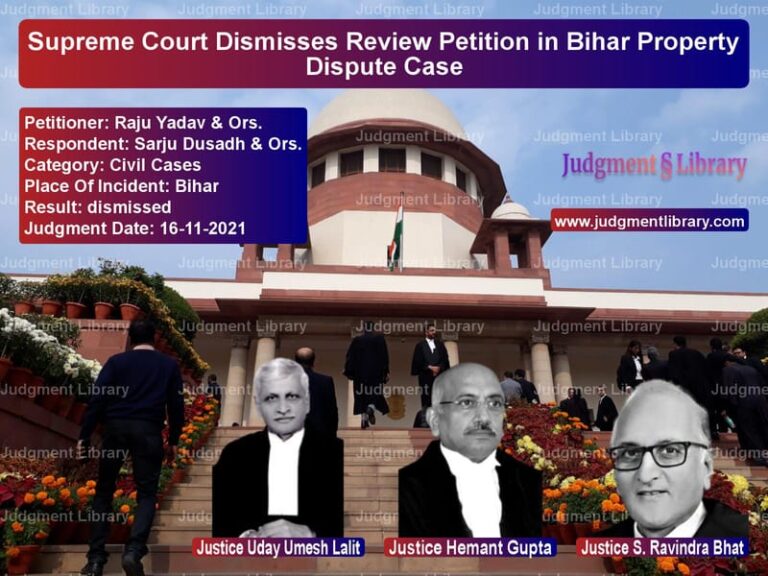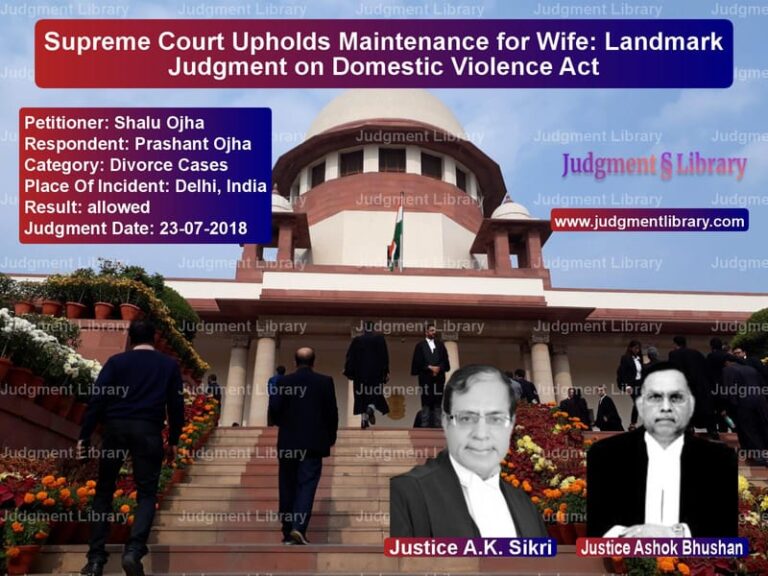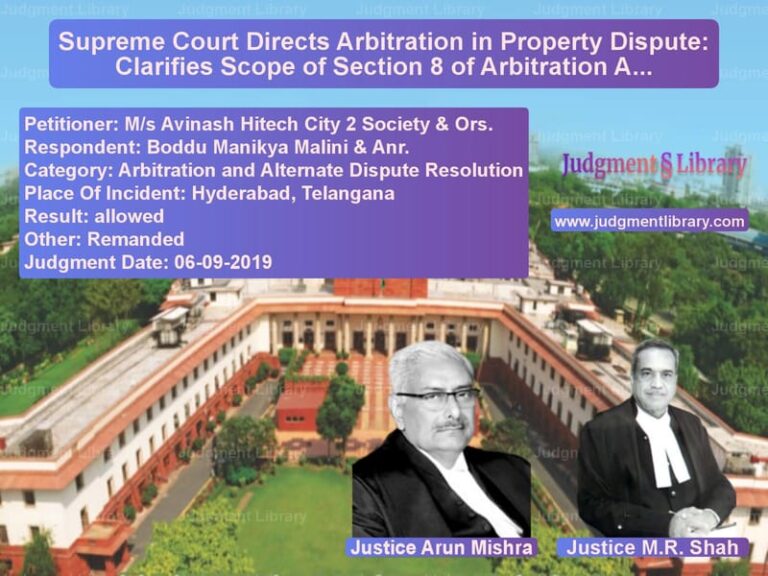Supreme Court Grants Interim Protection in Contempt Case Against Delhi Officials
The Supreme Court of India, in the case of Shri Anoop Srivastava & Another vs. Rais Ahmed (Barber) & Others, addressed an important matter related to contempt jurisdiction exercised by the Delhi High Court. The case revolved around whether interim protection should be granted to government officials facing contempt proceedings while the main case remained pending.
The Court ruled in favor of continuing the interim protection granted earlier to the petitioners until the High Court disposed of the main matter. This ruling underscores the principle that contempt proceedings must be handled with caution, particularly when public officials are involved.
Background of the Case
The case arose from contempt proceedings initiated in the Delhi High Court against Anoop Srivastava and other officials. The High Court had passed interim orders on October 14, 2014, December 3, 2014, and December 15, 2014, directing the petitioners to appear before the court.
The petitioners approached the Supreme Court, arguing that the High Court’s contempt orders were unjustified and that they should be granted protection until the main matter was resolved.
Petitioner’s (Anoop Srivastava & Others) Arguments
- The contempt orders were issued without a proper examination of whether a prima facie case of contempt was made out.
- Forcing government officials to appear before the court in contempt proceedings while the main matter was still pending would cause unnecessary harassment.
- They requested that the Supreme Court continue the interim stay granted earlier, preventing any coercive action against them.
Respondent’s (Rais Ahmed & Others) Arguments
- The petitioners had willfully disobeyed court orders, warranting the contempt proceedings.
- The High Court was justified in directing them to appear, as contempt of court undermines judicial authority.
- The Supreme Court should allow the contempt proceedings to continue without any further interference.
Supreme Court’s Ruling
The Supreme Court, in a judgment delivered by Justices Kurian Joseph and Rohinton Fali Nariman, ruled in favor of continuing the interim protection. The key observations of the Court were:
1. Interim Protection to Continue
The Court reaffirmed its earlier order from February 5, 2015, which granted interim protection to the petitioners. The ruling stated:
“Until further orders, the operation of the portion of the impugned orders dated 14.10.2014, 03.12.2014, and 15.12.2014 relating to the appearance of the petitioners or any other alleged contemnors/respondents shall remain stayed.”
2. High Court Free to Proceed With the Case
The Supreme Court clarified that the stay applied only to the personal appearance of the petitioners. The High Court was free to proceed with the contempt case in accordance with the law.
3. Continuation of Protection Until Disposal of Main Case
The Court emphasized that its protection order would remain in force until the Delhi High Court disposed of the main matter:
“After having heard the learned counsel appearing for both sides, we are of the view that the interim protection given by this Court shall continue till the main matters are disposed of by the High Court.”
Final Verdict
The Supreme Court issued the following directives:
- The earlier interim protection preventing the petitioners from appearing in person in the contempt case shall continue.
- The Delhi High Court was allowed to proceed with the contempt matter as per law.
- The petitioners shall remain protected until the High Court issues its final decision.
- The appeals were disposed of with no order as to costs.
Conclusion
This ruling highlights the importance of judicial discretion in contempt proceedings. The Supreme Court ensured that while judicial authority must be respected, unnecessary harassment of public officials through contempt proceedings should be avoided.
Key Takeaways:
- Contempt proceedings must be conducted with due process and fairness.
- Government officials should not be unnecessarily burdened with personal appearances in contempt cases if the main matter is still pending.
- Interim protection can be granted to prevent undue hardship while a case is being adjudicated.
- High Courts retain the authority to proceed with contempt cases as per law, but coercive actions can be stayed in appropriate cases.
This judgment serves as an important precedent in handling contempt cases involving public officials and ensures that judicial proceedings are balanced and fair.
Don’t miss out on the full details! Download the complete judgment in PDF format below and gain valuable insights instantly!
Download Judgment: Shri Anoop Srivastav vs Rais Ahmed (Barber) Supreme Court of India Judgment Dated 23-02-2016-1741852810941.pdf
Direct Downlaod Judgment: Direct downlaod this Judgment
See all petitions in Public Interest Litigation
See all petitions in Legislative Powers
See all petitions in Damages and Compensation
See all petitions in Judgment by Kurian Joseph
See all petitions in Judgment by Rohinton Fali Nariman
See all petitions in allowed
See all petitions in supreme court of India judgments February 2016
See all petitions in 2016 judgments
See all posts in Civil Cases Category
See all allowed petitions in Civil Cases Category
See all Dismissed petitions in Civil Cases Category
See all partially allowed petitions in Civil Cases Category







